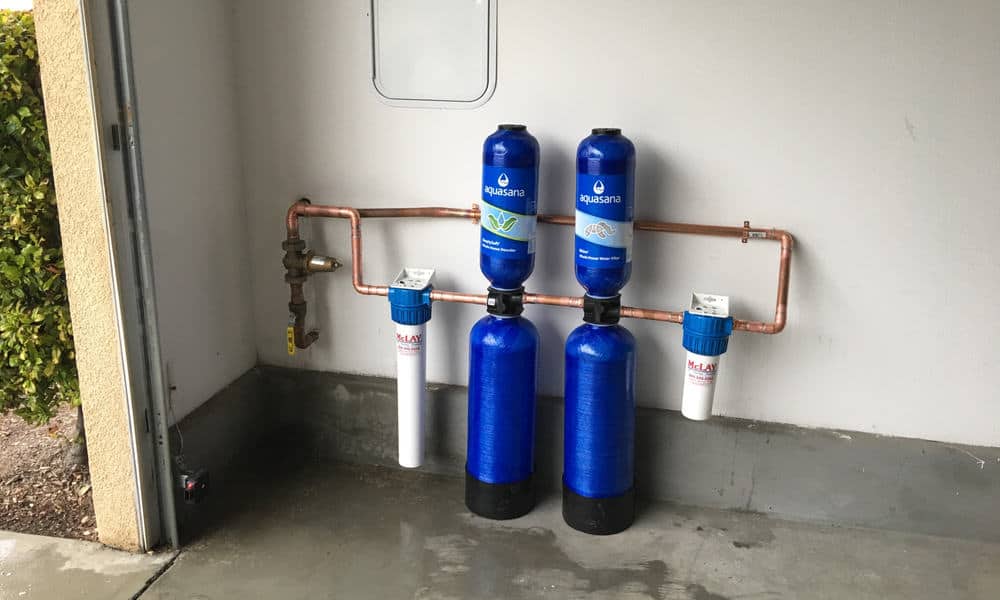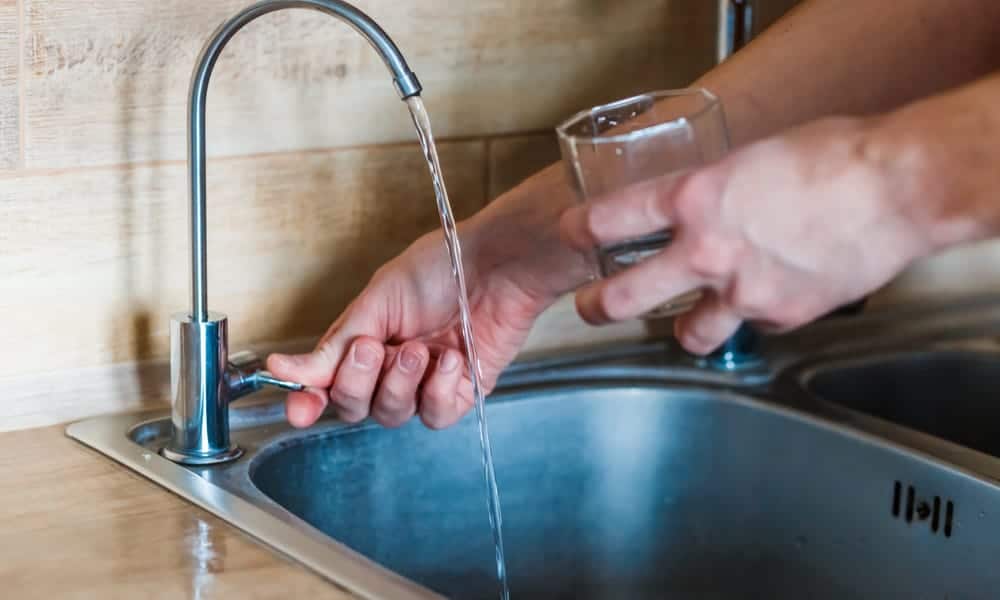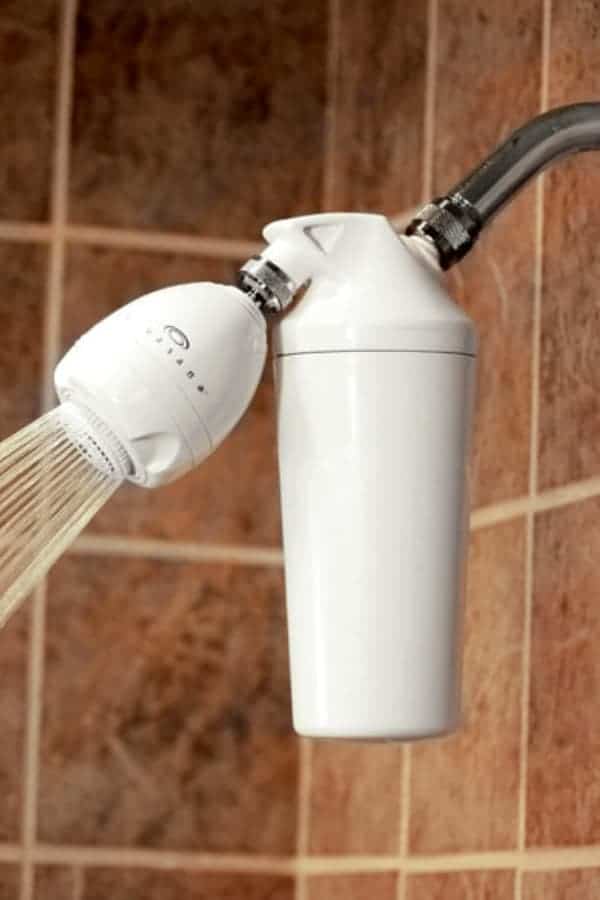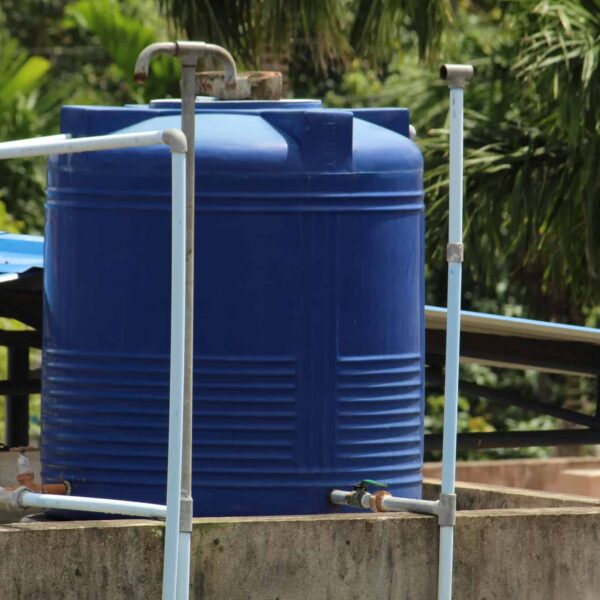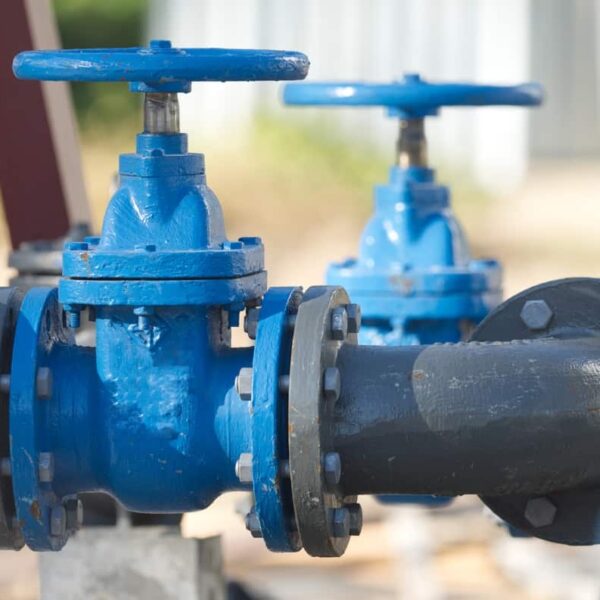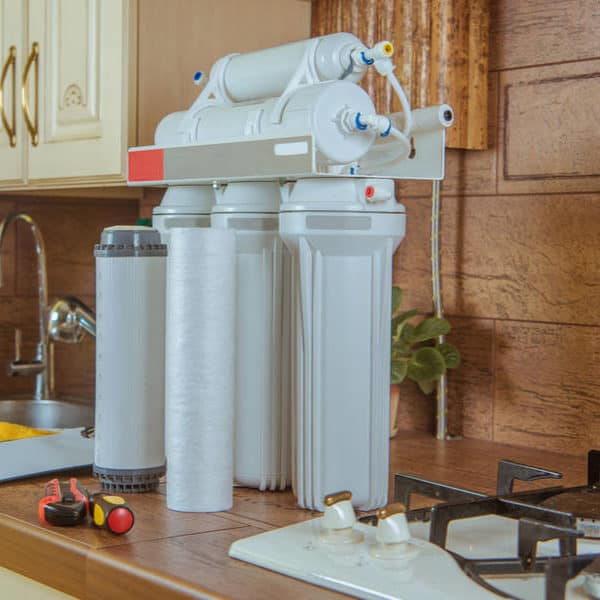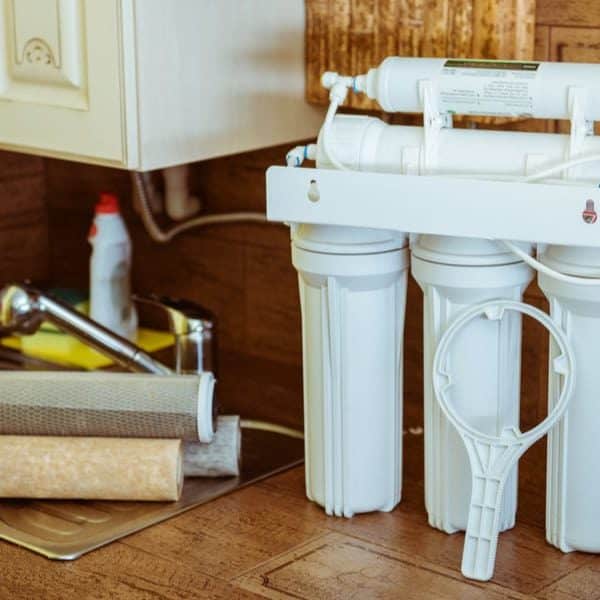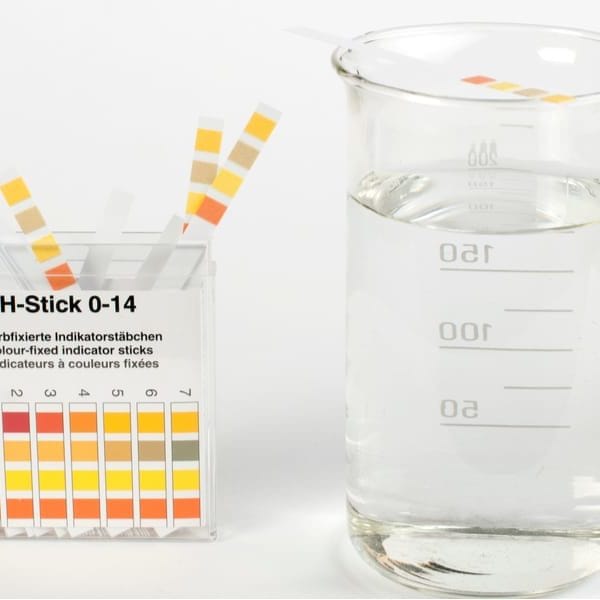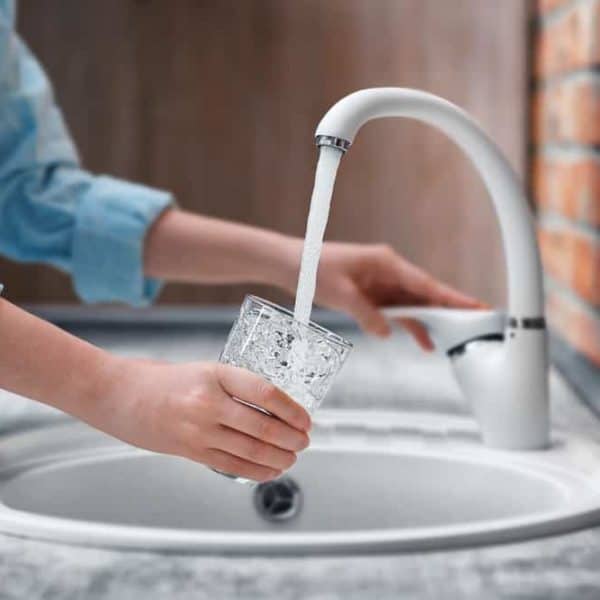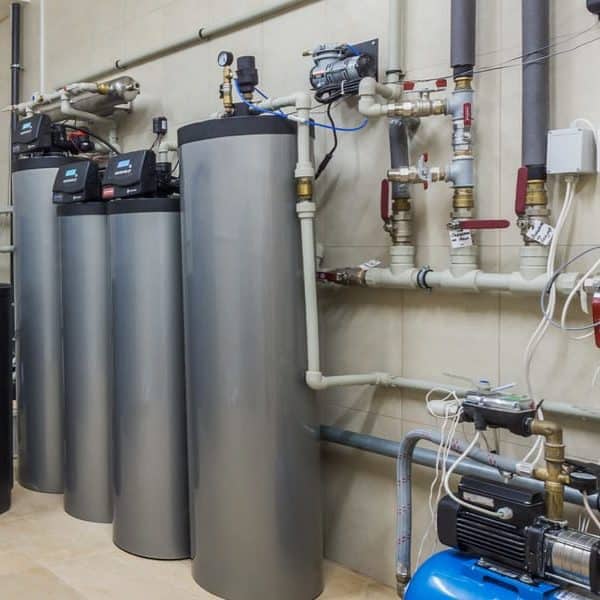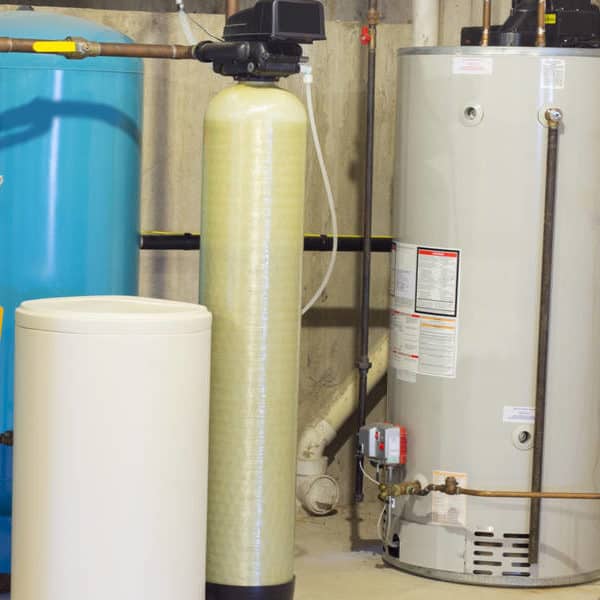Approximately 85% of households in the US have hard water with a high level of minerals, mostly calcium and magnesium. You can find out how hard your water is in grains per gallon according to the data in your municipality or by checking the map showing the hardness of the water in your region.
If you can’t find the precise information, you can also test water quality by using a self-testing or home kit. Once you confirm that the water in your home is hard, you can take action to soften it. Let’s see how to do that.6
Water Softening Options for Your Home
Even though most methods to make your water softer are often expensive and time-intensive, there are numerous DIY ways to do that demanding job without spending too much money. It’s up to you to decide which option is the best for your home.
1. Hard water solutions for the whole household
The capacity of the filter
The first thing you should do is to calculate the capacity of the filter you need. After determining the hardness of the water in your home in grains per gallon, you should multiply this number by the gallons of water using in your household daily.
Calculate daily water consumption according to the water bill, and the result will show you how many ‘grains’ of hardness your filter needs to soften each day.
Then, purchase a whole house water filter that can purify at least ten times the number of grains per gallon. That way, the device can work up to ten days without a break.
Let’s see the calculation. On average, most US residents use from 70 to 100 gallons of water a day, depending on its quality.
If the average hardness of water is ten grains per gallon, and your family spends 300 gallons per day, we can get the result quickly.
10 x 300 = 3,000 grains per gallon a day
When you multiply the result with ten, you will realize that you need a softener in the 30,000-grain range.
The type of filter
I will give you the best choices for your home, which can remove minerals and impurities from your water, as well.
- Reverse osmosis system – If you want to avoid a high level of sodium and potassium in your drinking water, it is the right solution for you.
- Salt-free water softener – If you have a problem with high blood pressure, you should consider this type of device for softening your water. It works by substituting hard minerals from the water with a potassium-chloride. That way, it prevents forming deposits of limescale to your pipes and appliances.
- Dual-tank softener – Since this device features two resin tanks, it will provide soft water for your household without pausing while working.
- Magnetic softener – You can quickly install this device onto the incoming pipe. It changes the electromagnetic properties of the minerals, mostly calcium-carbonate, by setting up a magnetic field and provides soft water for your family.
- The Aquasana system – By installing this salt-free water conditioner, you will get soft water in the whole house. Since this softening substitute won’t demineralize the water or leave salt in it, it is a healthy solution for both your body and the environment.
2. Hard water solutions for your kitchen
Boiling
The process of boiling can remove only ‘temporary hardness’ and won’t work in every case. However, it is worth checking if this method is efficient for your home.
Boil the tap water for a few minutes and let it cool for a few hours until seeing white precipitate settling to the pot bottom. Pour the water into the filter pitcher after pouring it a few times back and forward between two pots to remove the awful, so-called ‘flat’ flavor.
Ion exchange filter
Depending on the model you buy, you should attach it to a kitchen faucet or use the model with the pitcher for storing drinking water.
By using this device, you will get a better taste of the water, but it will mostly depend on the type of minerals your water contains. Keep in mind that this type of filter can’t remove all contaminants unless you purchase a model with an installed reverse osmosis system or carbon filter.
There is one more thing! If you are one of the people hating a taste of coffee prepared with soft water, you should pick out a faucet model with a switch-off valve.
Lemi Shine
There are a lot of products such as this one, which may reduce making hard water deposits on your glasses and dishes.
3. Hard water solutions for your appliances
Since you use the appliances in your household daily, you can expect that hard water will affect their performances negatively over time.
However, there are a few highly efficient solutions available, which can help you overcome the problem with hard water. Pick out the right one for every device in your home:
- Dishwasher – Choose a unit with a low drying temperature. That way, hard water won’t cause the occurrence of stains on your dishes. Keep in mind that this type of dishwasher requires more time for drying your dishes.
- Coffee maker – The most comfortable option for you is to use bottled water to make your coffee. That way, you will avoid an annoying mineral taste you may feel in your mouth after enjoying your morning coffee.
- Hot water heater – You should choose the right water softener to remove excess minerals from water and help your device works properly in the long run. Also, reducing the operating temperature may decrease the accumulation of minerals in your device. Don’t forget to flush the heater often to prevent clogging up.
- Small fixtures – The most efficient way to clean these units is by applying vinegar. Put the piece with a build-up of limestone into a bowl with white vinegar and let it stay overnight or until the calcium deposits dissolve.
If you use distilled vinegar, it will kill bacteria and destroy mold, as well. You can also solve the problem with a build-up of soap scum by rinsing it with diluted vinegar. Always combine:
- 1 part apple cider vinegar
- 3 parts filtered water
4. Hard water solutions for skin and hair
Hard water cause drying the skin and blocking pores after using the soap or shampoo. Also, it damages your hair when used regularly.
Nowadays, most contemporary showerheads have built-in water softeners. They can help you to avoid issues with skin irritation and dull hair. If your shower doesn’t have a filter, you can install one quickly.
There are a few efficient solutions to solve the unpleasant hair problems:
- Apple cider vinegar – Add a small amount of vinegar to water during hair washing. It will clear your hair of minerals, and it will become shiny and lush.
- Bottled water – If you don’t want to purchase a water softener or can’t install one for any reason, you can always buy bottled water for washing your hair. Most of the brands contain a lower level of minerals than hard tap water.
- Lemon juice – Adding this juice into the water while washing your hair can lower the level of its hardness and acidity.
5. Hard water solutions for your laundry
Non-precipitating water conditioner
You can attach this convenient device to your washing machine if the water in your home is too hard. That device can remove some minerals from water during washing, which will help your laundry to stay white and soft.
You don’t want a precipitating conditioner leaving limescale on both the washing machine and your clothes.
White vinegar
Diluted vinegar is an old but highly efficient stain remover. However, it is a cost-effective approach only if your water is slightly hard, and you need to clean stains that way occasionally. Otherwise, this solution is very tedious, especially if you have an issue with a quick scale building up.
Anyway, vinegar has numerous advantages. By adding it to the water, you will get soft towels and bleached white fabric. Keep in mind that you need to check the manual before adding vinegar to your washing machine. In some cases, it may damage the rubber parts of your machine.
Benefits of Using the Right Water Softener
It is crucial to efficiently solve the issue with hard water and prevent more severe problems in the future. A water softener will help you by:
- Reducing build-up of minerals on your sink, shower door, water tank, and faucets
- Reducing white deposits on dishes
- Prolonging the life of water heaters
- Eliminating build-up of soap scum on tiles, shower, tub, and shower curtain
- Preventing clogging shower heads
Also, if you choose the right model of the water softener, it will:
- Reduce the time necessary for cleaning your shower cabin and bathtub
- Make your hair fluffy, silky smooth, and lush
- Allow the rich lathering of shampoos and body soaps
Conclusion
There are a lot of disadvantages of hard water and just a few benefits. Therefore, solving the problem with hard water in your home will help you stay healthy. Plus, the right softener will allow your appliances to work smoothly for an extended period.
